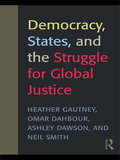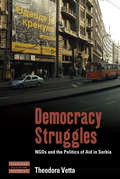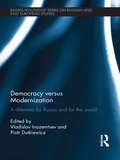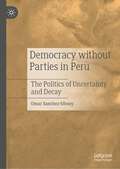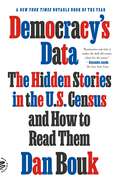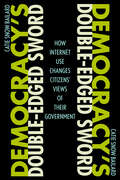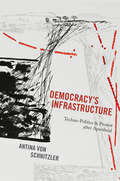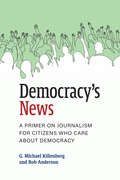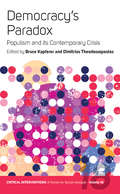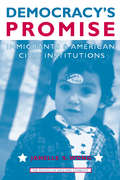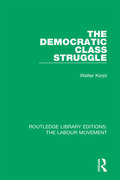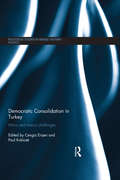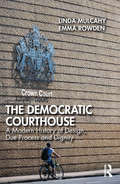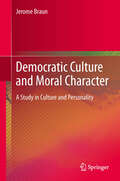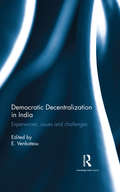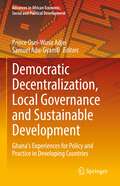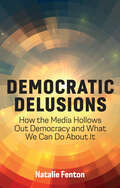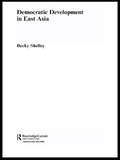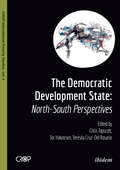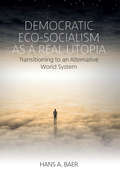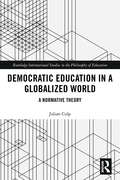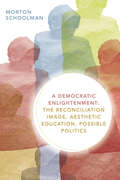- Table View
- List View
Democracy, States, and the Struggle for Social Justice
by Heather Gautney Omar Dahbour Ashley Dawson Neil SmithDemocracy, States, and the Struggle for Social Justice draws on the fields of geography, political theory, and cultural studies to analyze experiments with novel forms of democracy, highlighting the critical issue of the changing nature of the state and citizenship in the contemporary political landscape as they are buffeted by countervailing forces of corporate globalization and participatory politics. Using interesting case studies, the book explores these 3 main themes: the meaning of radical democracy in light of recent developments in democratic theory new spatial arrangements or scales of democracy – from local to global, from streets protests to the development of transnational networks the character and role of states in the development of new forms of democracy The book asks and answers: are participatory models of democracy viable alternatives in their own right or are they best understood as supplemental to traditional representative democracy? What are the conditions that give rise to the development of such models and are they equally effective at every scale; i.e., do they only realize their radical potential in particular, local places? A useful text in a broad range of advanced undergraduate courses including social movements, political sociology or geography, political philosophy.
Democracy Struggles: NGOs and the Politics of Aid in Serbia (Dislocations #25)
by Theodora VettaTracing the boom of local NGOs since the 1990s in the context of the global political economy of aid, current trends of neoliberal state restructuring, and shifting post-Cold War hegemonies, this book explores the “associational revolution” in post-socialist, post-conflict Serbia. Looking into the country’s “transition” through a global and relational analytical prism, the ethnography unpacks the various forms of dispossession and inequality entailed in the democracy-promotion project.
Democracy versus Modernization: A Dilemma for Russia and for the World (BASEES/Routledge Series on Russian and East European Studies)
by Piotr Dutkiewicz Vladislav InozemtsevThis book seeks to "re-think democracy." Over the past years, there has been a tendency in the global policy community and, even more widely, in the world’s media, to focus on democracy as the "gold standard" by which all things political are measured. This book re-examines democracy in Russia and in the world more generally, as idea, desired ideal, and practice. A major issue for Russia is whether the modernization of Russia might not prosper better by Russia focusing directly on modernization and not worrying too much about democracy. This book explores a wide range of aspects of this important question. It discusses how the debate is conducted in Russia; outlines how Russians contrast their own experiences, unfavourably, with the experience of China, where reform and modernization have been pursued with great success, with no concern for democracy; and concludes by assessing how the debate in Russia is likely to be resolved.
Democracy Without Decency: Good Citizenship and the War on Poverty (G - Reference, Information and Interdisciplinary Subjects)
by William M. EpsteinThe conservative attacks on the welfare system in the United States over the past several decades have put liberal defenders of poverty relief and social insurance programs on the defensive. In this no-holds-barred look at the reality of American social policy since World War II, William Epstein argues that this defense is not worth mounting—that the claimed successes of American social programs are not sustained by evidence. Rather than their failure being the result of inadequate implementation or political resistance stemming from the culture wars, these programs and their built-in limitations actually do represent what the vast majority of people in this country want them to be. However much people may speak in favor of welfare, the proof of what they really want is in the pudding of the social policies that are actually legislated. The stinginess of America’s welfare system is the product of basic American values rooted in the myth of “heroic individualism” and reinforced by a commitment to social efficiency, the idea that social services need to be minimal and compatible with current social arrangements.
Democracy without Parties in Peru: The Politics of Uncertainty and Decay
by Omar Sanchez-SibonyThis book provides an in-depth look into key political dynamics that obtain in a democracy without parties, offering a window into political undercurrents increasingly in evidence throughout the Latin American region, where political parties are withering. For the past three decades, Peru has showcased a political universe populated by amateur politicians and the dominance of personalism as the main party–voter linkage form. The study peruses the post-2000 evolution of some of the key Peruvian electoral vehicles and classifies the partisan universe as a party non-system. There are several elements endogenous to personalist electoral vehicles that perpetuate partylessness, contributing to the absence of party building. The book also examines electoral dynamics in partyless settings, centrally shaped by effective electoral supply, personal brands, contingency, and iterated rounds of strategic voting calculi. Given the scarcity of information electoral vehicles provide, as well as the enormously complex political environment Peruvian citizens inhabit, personal brands provide readymade informational shortcuts that simplify the political world. The concept of “negative legitimacy environments” is furnished to capture political settings comprised of supermajorities of floating voters, pervasive negative political identities, and a generic citizen preference for newcomers and political outsiders. Such environments, increasingly present throughout Latin America, produce several deleterious effects, including high political uncertainty, incumbency disadvantage, and political time compression. Peru’s “democracy without parties” fails to deliver essential democratic functions including governability, responsiveness, horizontal and vertical accountability, or democratic representation, among others.
Democracy's Data: The Hidden Stories in the U.S. Census and How to Read Them
by Dan BoukFrom the historian Dan Bouk, a lesson in reading between the lines of the U.S. census to uncover the stories behind the data.The census isn’t just a data-collection process; it’s a ritual, and a tool, of American democracy. Behind every neat grid of numbers is a collage of messy, human stories—you just have to know how to read them.In Democracy’s Data, the data historian Dan Bouk examines the 1940 U.S. census, uncovering what those numbers both condense and cleverly abstract: a universe of meaning and uncertainty, of cultural negotiation and political struggle. He introduces us to the men and women employed as census takers, bringing us with them as they go door to door, recording the lives of their neighbors. He takes us into the makeshift halls of the Census Bureau, where hundreds of civil servants, not to mention machines, labored with pencil and paper to divide and conquer the nation’s data. And he uses these little points to paint bigger pictures, such as of the ruling hand of white supremacy, the place of queer people in straight systems, and the struggle of ordinary people to be seen by the state as they see themselves.The 1940 census is a crucial entry in American history, a controversial dataset that enabled the creation of New Deal era social programs, but that also, with the advent of World War Two, would be weaponized against many of the citizens whom it was supposed to serve. In our age of quantification, Democracy’s Data not only teaches us how to read between the lines but gives us a new perspective on the relationship between representation, identity, and governance today.
Democracy’s Detectives: The Economics of Investigative Journalism
by James T. HamiltonInvestigative journalism holds democracies and individuals accountable to the public. But important stories are going untold as news outlets shy away from the expense of watchdog reporting. Computational journalism, using digital records and data-mining algorithms, promises to lower the cost and increase demand among readers, James Hamilton shows.
Democracy's Double-Edged Sword: How Internet Use Changes Citizens' Views of Their Government
by Catie Snow Bailard“Playing into the hands of neither the cyber-optimists nor the cyber-pessimists . . . this book makes a major contribution to our understanding.” —Talia Stroud, author of Niche News: The Politics of News ChoiceThe beauty of democracy is not only that citizens can vote a candidate into office but that they can also vote one out. As digital media has grown omnipresent, it becomes more important for political scientists and communication scholars to understand its influence on all aspects of the political process, from campaigning to governance. Catie Snow Bailard argues that the Internet—by altering the quantity and range of information available to citizens—directly influences the ability of individuals to evaluate government performance. It also affects public satisfaction with the quality of available democratic practices and helps motivate political activity and organization.Bailard originates two theories for democratization specialists to consider—mirror-holding and window-opening—which she tests using data collected from dozens of countries and two randomized field experiments. Mirror-holding explores how accessing the Internet allows citizens to see a more detailed and nuanced view of their own government’s performance. Window-opening, however, enables those same citizens to glimpse how other governments perform, particularly in comparison to their own.This book offers a robust empirical foundation for testing the Internet’s effects on democratic attitudes—and reminds us that access to information does not necessarily ensure that democracy will automatically flourish.“An outstanding book on democracy and the Internet…highly original.” —Choice
Democracy's Infrastructure: Techno-Politics and Protest after Apartheid
by Antina Von SchnitzlerIn the past decade, South Africa's "miracle transition" has been interrupted by waves of protests in relation to basic services such as water and electricity. Less visibly, the post-apartheid period has witnessed widespread illicit acts involving infrastructure, including the nonpayment of service charges, the bypassing of metering devices, and illegal connections to services. Democracy's Infrastructure shows how such administrative links to the state became a central political terrain during the antiapartheid struggle and how this terrain persists in the post-apartheid present. Focusing on conflicts surrounding prepaid water meters, Antina von Schnitzler examines the techno-political forms through which democracy takes shape.Von Schnitzler explores a controversial project to install prepaid water meters in Soweto--one of many efforts to curb the nonpayment of service charges that began during the antiapartheid struggle--and she traces how infrastructure, payment, and technical procedures become sites where citizenship is mediated and contested. She follows engineers, utility officials, and local bureaucrats as they consider ways to prompt Sowetans to pay for water, and she shows how local residents and activists wrestle with the constraints imposed by meters. This investigation of democracy from the perspective of infrastructure reframes the conventional story of South Africa's transition, foregrounding the less visible remainders of apartheid and challenging readers to think in more material terms about citizenship and activism in the postcolonial world.Democracy's Infrastructure examines how seemingly mundane technological domains become charged territory for struggles over South Africa's political transformation.
Democracy's News: A Primer on Journalism for Citizens Who Care about Democracy
by G. Michael Killenberg Rob AndersonSince the Founding, America’s faith in a democratic republic has depended on citizens who could be trusted to be communicators. Vigorous talk about equality, rights, and collaboration fueled the Revolution, the Declaration of Independence, and the Constitution with its amendments. In a republic, the people set the terms for their lives not individually, but in community. The genius of keeping it alive exists in how everyday citizens talk and listen, write and read, for a common good. Dialogue and deliberation—rather than an accumulation of individual preferences—sustains a republic, yet a diminished and scarred institution of journalism jeopardizes citizens’ access to shared and truthful information. A disturbing “what’s in it for me?” attitude has taken over many citizens, and a creeping, autocratic sense of dismissive accusation too often characterizes the political style of elected officials. The basic fuel for democracy is the willingness of informed citizens to take each other seriously as they talk about political choices. Once we begin to clam up, build walls, and dismiss each other, we unravel the threads tying us to the Founders’ vision of a republic. A free press and free speech become meaningless if not supported by sustained listening to multiple positions. There are those who profit by dividing citizens into two camps: a comfortable “us” versus a scary “them.” They make their case with accusations and often with lies. They warp the very meaning of communication, hoping citizens never truly discover each other’s humanity. Democracy’s News discusses today’s problems of public communication in the context of history, law, and interpersonal life. News should not be something to dread, mistrust, or shun. Aided by reliable, factual journalism, citizens can develop a community-based knowledge to cope with social issues great and small. They come to treat neighbors and strangers as more than stereotypes or opponents. They become collaborators with whom to identify and sustain a working republic where news, citizenship, and public discourse merge.
Democracy's Paradox: Populism and its Contemporary Crisis (Critical Interventions: A Forum for Social Analysis #18)
by Bruce Kapferer Dimitrios TheodossopoulosDoes populism indicate a radical crisis in Western democratic political systems? Is it a revolt by those who feel they have too little voice in the affairs of state or are otherwise marginalized or oppressed? Or are populist movements part of the democratic process? Bringing together different anthropological experiences of current populist movements, this volume makes a timely contribution to these questions. Contrary to more conventional interpretations of populism as crisis, the authors instead recognize populism as integral to Western democratic systems. In doing so, the volume provides an important critique that exposes the exclusionary essentialisms spread by populist rhetoric while also directing attention to local views of political accountability and historical consciousness that are key to understanding this paradox of democracy.
Democracy's Promise: Immigrants and American Civic Institutions
by Janelle S. WongWong (political science, American studies and ethnicity, U. of Southern California) finds inclusion an integral part of the ongoing American experiment with democracy. She examines the demographic and political trends that have come from the most recent waves of immigrants who have turned to citizenship as part of their personal experiment with American-style democracy, and analyzes the ways in which immigrant citizens have become part of their local as well as national community when they were expected to be the least likely to develop activist behaviors. Concentrating on Chinese and Mexican immigrant citizens through extensive interviews in New York City and Los Angeles, and finding that voting is often the only way in which minorities can exercise legitimate political power, she uses her findings to describe how civic institutions can and should understand the political needs of immigrants. Annotation ©2006 Book News, Inc. , Portland, OR (booknews. com)
Democracy’s Slaves
by Paulin IsmardChallenging the modern belief that democracy and bondage are incompatible, Paulin Ismard directs our attention to ancient Athens, where the functioning of civic government depended on skilled, knowledgeable experts who were literally public servants—slaves owned by the city-state rather than by private citizens.
The Democratic Class Struggle (Routledge Library Editions: The Labour Movement #22)
by Walter KorpiFirst published in 1983. This book combines a case study of class relations, politics and voting in Sweden with a comparative analysis of distributive conflicts and politics in eighteen OECD countries. Its underlying theoretical theme is the development of class relations in free-enterprise or capitalise democracies. This title will be of interest to students of history and politics.
Democratic Consolidation in Turkey: Micro and macro challenges (Routledge Studies in Middle Eastern Politics)
by Paul Kubicek Cengiz ErisenWhile Turkey has made major strides in democratic reforms in the late 1990s and early 2000s, progress has, in many ways, stalled. Turkey remains "democratic" in the sense that attaining political power depends upon winning votes, but in recent years its leadership has taken a majoritarian view of democracy and the country has faced problems on issues such as rule of law, freedom of speech, and increased polarization. This book explores the understanding and practice of democracy in Turkey since the early 2000s, analyzing its evolution in light of the parliamentary elections held in 2015. Adopting a more holistic approach in line with the writing of Wolfgang Merkel, it recognizes that a successful, consolidated democracy has various micro and macro-level foundations. The former includes factors such as political values, tolerance, identity, and civil society, while the latter includes political economy, party competition, and institutional development. This volume rejects purely descriptive assessments and instead employs theoretical perspectives to analyze a dynamic political environment. It brings together a range of noted specialists on Turkish politics and society, who employ different methodological approaches and frameworks to offer a distinct scholarly work on democratization in Turkey. A thorough analysis of the problems of democratic consolidation, alongside an awareness of the theoretical and methodological debates in the discipline, make this book essential reading for students, scholars and policymakers interested in Turkish politics, as well as democratization and democratic transitions more generally.
The Democratic Courthouse: A Modern History of Design, Due Process and Dignity
by Linda Mulcahy Emma RowdenThe Democratic Courthouse examines how changing understandings of the relationship between government and the governed came to be reflected in the buildings designed to house the modern legal system from the 1970s to the present day in England and Wales. The book explores the extent to which egalitarian ideals and the pursuit of new social and economic rights altered existing hierarchies and expectations about how people should interact with each other in the courthouse. Drawing on extensive public and private archives kept by the Ministry of Justice, but also using case studies from other jurisdictions, the book details how civil servants, judges, lawyers, architects, engineers and security experts have talked about courthouses and the people that populate them. In doing so, it uncovers a changing history of ideas about how the competing goals of transparency, majesty, participation, security, fairness and authority have been achieved, and the extent to which aspirations towards equality and participation have been realized in physical form. As this book demonstrates, the power of architecture to frame attitudes and expectations of the justice system is much more than an aesthetic or theoretical nicety. Legal subjects live in a world in which the configuration of space, the cues provided about behaviour by the built form and the way in which justice is symbolised play a crucial, but largely unacknowledged, role in creating meaning and constituting legal identities and rights to participate in the civic sphere. Key to understanding the modern day courthouse, this book will be of interest to legal scholars and students in all fields of law, sociology, political science, psychology and criminology.
Democratic Culture and Moral Character
by Jerome BraunThis book returns critical theory to its roots in both psychology and the social sciences. It shows some of the relationships between equality in a political and social sense and personal identity that either relates well to such equality, or rebels against it. All this reflects processes of social and cultural influence that involve not only random change but also processes of social and cultural evolution that themselves have effects regarding potentials for self-fulfillment and even public morality. This book provides a framework to help one study the interaction between individual aspirations and social opportunities. Jerome Braun, known for his writings in interdisciplinary social science, an approach he calls pragmatic critical theory, here provides a book that discusses issues relevant to the moral underpinnings of democratic society, including issues of social evolution and of culture and personality. This book will be of particular interest to scholars and students of Psychology (particularly in the areas of Psychology of Personality and Cultural Psychology), Sociology (especially those interested in Sociology of Alienation and Sociology of Culture, as well as Sociology of Mental Health), Anthropology (particularly in the area of Psychological Anthropology), Cultural Studies, and Social Theory in general.
Democratic Decentralization in India: Experiences, issues and challenges
by E. VenkatesuThis book explores experiences, issues and challenges which have emerged since Constitutional status was granted to the local bodies at grassroots level in India in the early 1990s. Among other issues, it focuses on: the contrasting political ideas of Mahatma Gandhi and B. R. Ambedkar on Panchayati Raj Institutions the legal and constitutional provisions which were introduced through the 73rd and 74th Amendment Acts the devolution process, status and challenges of democracy for local governmental bodies empowerment of the women and lower castes through reservations in the local bodies governance in Schedule V and VI tribal areas Based on extensive fieldwork across India, this volume will be useful to scholars and researchers of political science, sociology, public administration as well as policymakers and civil society activists.
Democratic Decentralization, Local Governance and Sustainable Development: Ghana's Experiences for Policy and Practice in Developing Countries (Advances in African Economic, Social and Political Development)
by Prince Osei-Wusu Adjei Samuel Adu-GyamfiDrawing on field-based data and experiences from the practice of democratic decentralization and local governance over the last three decades in Ghana, this book examines whether and how democratic decentralization and local governance reforms in developing countries have produced the anticipated development outcomes.In seventeen related contributions, the authors present four relevant focal themes, including conceptual and historical trajectories of decentralization and local governance; institutional choice, democratic representation, and poverty reduction; local governance, resource capacity, and service delivery; and non-state actors, local governance and sustainable development. The book blends perspectives of scholars, practitioners, and policy-makers to provide a holistic analysis of linkages between decentralization, local governance, and sustainable development efforts, presenting a novel and useful guide for science, policy, and practice of bottom-up governance and development. It provides relevant lessons and experiences for scholars, policy-makers, and development practitioners in Africa in particular and developing countries in general.
Democratic Delusions: How the Media Hollows Out Democracy and What We Can Do About It
by Natalie FentonA free media is inextricably linked to a healthy democracy, but in many parts of the world liberal democracies are deemed to be dying or on the demise – a demise that many forms of media have enabled while heralding themselves as democracy’s saviour. The hollowing out of democracy in these ways has left many people questioning the value of (neo)liberal democratic societies. What can we do about it? Democratic Delusions explores the potential of our media and tech systems to be democratic and contribute to a just and transformative democracy. This is only possible, Natalie Fenton argues, by first situating our political systems and mediated worlds within global capitalism. By interrogating different media and their relationship to seven key elements of democracy – power, participation, freedom, equality, public good, trust, and hope – the book asks: What is the response of society when the ability of news media to speak truth to power has been restricted by corporate logic? And, how do we tackle a deep-rooted market logic that shifts public debate towards private interest and marginalizes progressive perspectives? The book explores how these elements can be reimagined through newly conceived media and tech landscapes and, ultimately, what democracy might be in a future mediated world that places more power in the hands of more people. This is essential reading for students and scholars of media and communications, journalism, political communications, political science, and sociology.
Democratic Development in East Asia (Politics in Asia)
by Becky ShelleyDemocratic Development in East Asia explores an important but neglected topic in the literature on democratization in East Asia: the international dimension of democratization. It presents a coherent and comprehensive analysis of the impact of external political, economic and cultural factors on China, South Korea and Taiwan's political development since World War II. The author analyzes the circumstances under which the international context affects domestic actors' choice of political institutions and actions and concentrates on a selection of key international structures and actors that make up this complex picture. Shelley also examines the international political economy, aspects of the United Nations system, diffuse cultural factors and processes, democracy movements, and a number of international non-government organizations.
The Democratic Developmental State: North-South Perspectives (CROP International Poverty Studies #4)
by Chris Tapscott Tor Halvorsen Teresita Cruz-Del RosarioThe concept of a democratic developmental state is part of the current development discourse advocated by international aid agencies, deliberated on by academics, and embraced by policymakers in many emerging economies in the global South. What is noticeable in this discourse is how little attention has been paid to a discussion of the essence of a democratic developmental state, and much of what passes for theory is little more than policy-speak and political rhetoric.This volume fills a gap in the literature on the democratic developmental state. Analyzing the different approaches to the implementation of democratic developmental states in various countries, it evaluates the extent to which these are merely replicating the central tenets of the East Asian model of the developmental state or if they are succeeding in their attempts to establish a new and more inclusive conceptualization of the state. In particular, the authors scrutinize to what degree the attempts to build a democratic developmental state may be distorted by the imperatives of neoliberalism. The volume broadens the understanding of the Nordic model of a democratic developmental state and shows how it represents an additional, and perhaps contending understanding of the developmental state derived from the East Asian experience.
Democratic Eco-Socialism as a Real Utopia: Transitioning to an Alternative World System
by Hans A. BaerAs global economic and population growth continues to skyrocket, increasingly strained resources have made one thing clear: the desperate need for an alternative to capitalism. In Democratic Eco-Socialism as a Real Utopia, Hans Baer outlines the urgent need to reevaluate historical definitions of socialism, commit to social equality and justice, and prioritize environmental sustainability. Democatic eco-socialism, as he terms it, is a system capable of mobilizing people around the world, albeit in different ways, to prevent on-going human socio-economic and environmental degradation, and anthropogenic climate change.
Democratic Education in a Globalized World: A Normative Theory (Routledge International Studies in the Philosophy of Education)
by Julian CulpDue to the economic and social effects of globalization democracy is currently in crisis in many states around the world. This book suggests that solving this crisis requires rethinking democratic education. It argues that educational public policy must cultivate democratic relationships not only within but also across and between states, and that such policy must empower citizens to exercise democratic control in domestic as well as in inter- and transnational politics. Democratic Education in a Globalized World articulates and defends democratic conceptions of global citizenship education and educational justice on the basis of a democratic understanding of global justice. It will be of interest to researchers across the fields of education, political theory, philosophy, development and postcolonial studies.
A Democratic Enlightenment: The Reconciliation Image, Aesthetic Education, Possible Politics
by Morton SchoolmanIn A Democratic Enlightenment Morton Schoolman proposes aesthetic education through film as a way to redress the political violence inflicted on difference that society constructs as its racialized, gendered, Semitic, and sexualized other. Drawing on Voltaire, Diderot, and Schiller, Schoolman reconstructs the genealogical history of what he calls the reconciliation image—a visual model of a democratic ideal of reconciliation he then theorizes through Whitman's prose and poetry and Adorno's aesthetic theory. Analyzing The Help (2011) and Gentleman's Agreement (1947), Schoolman shows how film produces a more advanced image of reconciliation than those originally created by modernist artworks. Each film depicts violence toward racial and ethnic difference while also displaying a reconciliation image that aesthetically educates the public about how the violence of constructing difference as otherness can be overcome. Mounting a democratic enlightenment, the reconciliation image in film illuminates a possible politics for challenging the rise of nationalism's violence toward differences in all their diversity.
